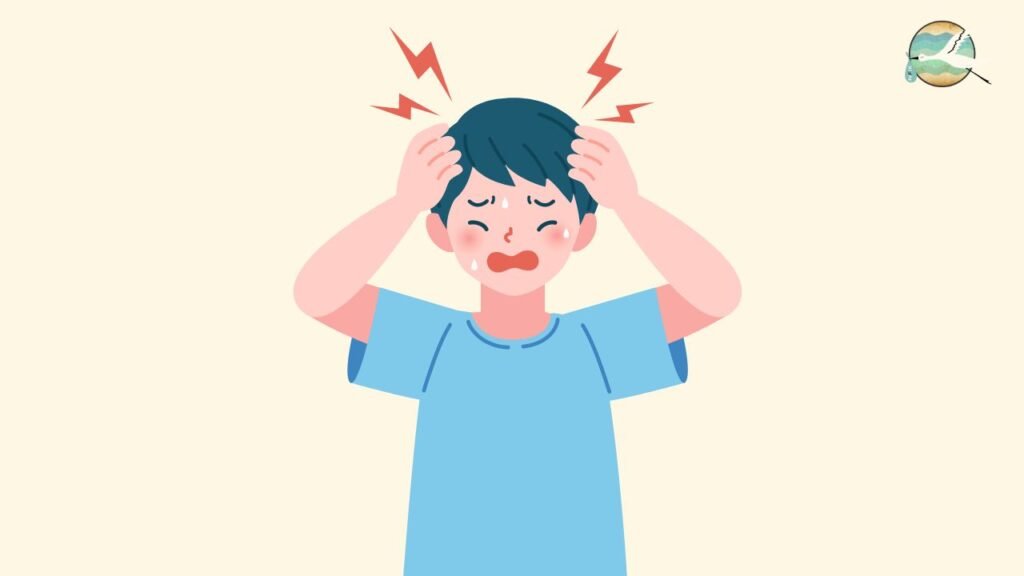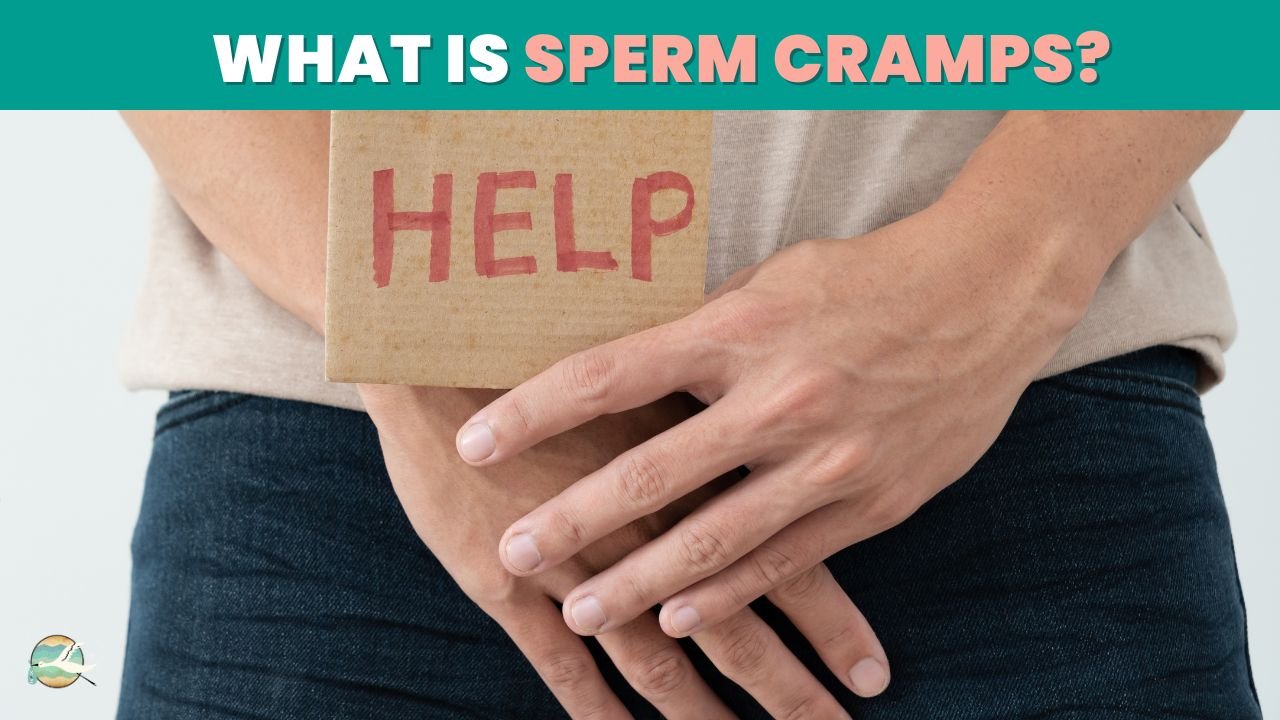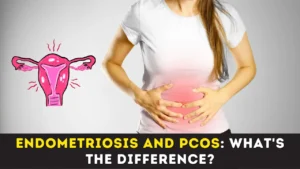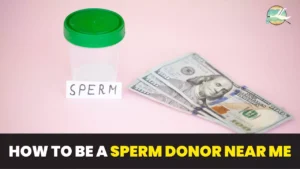Do you want to know What is Sperm Cramps? The causes, symptoms, and potential treatments for this unusual phenomenon are all covered in detail in this extensive article. Explore this intriguing subject by reading on.
Table of Contents
Sperm cramps are a common but under-discussed issue. Many men experience pain or discomfort in the lower abdomen, testicles, or perineum after ejaculation. While the exact cause of cramps is unknown, there are a number of possible explanations, including sperm buildup, muscle spasms, and medical conditions.
Most cases of sperm cramps are mild and go away on their own. However, there are a few things that men can do to help relieve the pain and prevent cramps from happening in the first place. This article will provide a comprehensive overview of sperm cramps, including their causes, symptoms, treatment options, and prevention tips.
What are Sperm Cramps?

Sperm cramps, also referred to as post-coital cramps, are the discomfort or pain that some people feel in their lower abdomen or pelvic area after ejaculating. Despite not receiving much attention, this phenomenon can be upsetting for those who experience it. Although cramps are frequently harmless and transient, knowing their underlying causes can give you peace of mind and help you cope with any potential discomfort.
What causes sperm cramps?
In the medical community, “sperm cramps” is not a term that is frequently used. You could be talking about testicular pain or discomfort, which can have a number of underlying causes. It’s crucial to see a doctor for a proper diagnosis and treatment if you’re feeling any pain or discomfort in the genital area. Having said that, the following list includes some potential causes of testicular pain or discomfort:
Testicular Torsion: The spermatic cord, which supplies blood to the testicle, twists in this serious condition. Due to the restricted blood flow caused by the twisting, the affected testicle experiences excruciating pain and swelling. In order to protect the testicles, it is a medical emergency that needs to be attended to right away.
Epididymitis: It is an inflammation of the epididymis, a coiled tube behind the testicle. Infections like urinary tract infections or sexually transmitted infections may be to blame for this inflammation. It causes pain and tenderness in the testicle that is affected, as well as possible swelling and discomfort in the groin area.
Orchitis: Inflammation of the testicle itself is known as orchitis. It frequently results from bacterial infections or viral infections like mumps. This condition causes swelling, tenderness, and pain in the testicle that is affected. The epididymis and testis may both be inflamed at the same time in some circumstances.
Inguinal Hernia: An inguinal hernia happens when a section of the intestine pushes through a weak spot in the abdominal wall and into the groin region. You may experience discomfort and pain as a result, and you could see a bulge in your scrotum or groin. The testicular region may occasionally experience pain as well.
Kidney Stones: Hard mineral and salt deposits called kidney stones develop in the kidneys. Renal colic is the name for the severe pain they can cause when they pass through the urinary tract. The lower abdomen and even the testicles may feel this pain coming from the back.
Prostatitis: Under the bladder, the prostate gland may swell and become inflamed as a result of an infection or other factors. Prostatitis is a condition that can cause discomfort, pain in the pelvic area, and occasionally pain that radiates to the testicles.
You should seek medical help right away if you have testicular pain or discomfort, it’s important to remember. The cause and the best course of treatment can only be determined with precision by a medical professional. Seeking immediate medical attention is especially crucial if the pain is sudden, severe, or coupled with other symptoms like fever or nausea.
What are the Symptoms of Sperm Cramps?
Sperm cramps, also known as semen cramps or ejaculatory cramps, are the pain or discomfort that some men experience during or after ejaculation. The symptoms of cramps can vary from person to person, but common symptoms include:

Pain or Discomfort: This is the main sign of sperm cramps, which can be uncomfortable or painful.
Swelling or Enlargement: If one of your testicles or the entire scrotum seems larger or swollen than usual, this may be a sign of an underlying problem that is causing fluid buildup or inflammation.
Tenderness: The term “tenderness” describes an increased receptivity to pressure or touch. If the testicle or the surrounding area is tender, touching it may be uncomfortable or even painful.
Pain Radiation: It follows that the pain you’re experiencing might not be restricted to just your testicle and instead could spread to other places. For instance, you might experience groin pain that spreads to your lower back, inner thigh, or lower abdomen.
Remember that sporadic cramps are not always a sign of a serious medical condition. However, if a man frequently experiences pain during or after ejaculation, seeking medical attention is necessary.
How to Relieve Sperm Cramps?

There are actions you can take to resolve the situation if you’re experiencing genital discomfort or pain. To lessen pressure and swelling, think about resting and elevating your legs with a pillow. Choose supportive undergarments like briefs because they can provide gentle support and reduce friction, which could lead to discomfort.
A warm compress applied for 15 to 20 minutes at a time can help soothe and relax tense muscles. Following the dosage recommendations, over-the-counter painkillers like ibuprofen or acetaminophen can help control pain and inflammation. It’s crucial to stay hydrated, especially if you think you might have a urinary problem. Take a break from physically demanding activities if the discomfort is caused by strain.
But it’s important to get medical help if your symptoms continue, get worse, or are accompanied by vomiting, fever, or excruciating pain. The underlying cause can be correctly identified by a healthcare professional, who can also suggest the best course of action for your particular circumstances.
Are sperm cramps as painful as period cramps?
Sperm cramps do not hurt as much as period cramps. The tubes that transport sperm from the testicles to the urethra, known as the vas deferens, contract, resulting in cramps. A dull ache in the lower abdomen or groin may be experienced during these contractions. The muscular organ that houses the fetus during pregnancy, the uterus, contracts during period cramps. Compared to sperm cramps, these contractions may be much more painful and intense.
In addition, cramps usually only last a few minutes, whereas period cramps can last for several hours or even days. Contrary to period cramps, sperm cramps are less frequent. Sperm cramps are a common occurrence for men, though they don’t happen all the time. Contrarily, for most women, the menstrual cycle includes regular bouts of period pain.
To rule out any underlying medical conditions, you need to see a doctor if you have severe or ongoing pain in your lower abdomen or groin.
How to prevent sperm cramps?
There are a few things that men can do to help prevent sperm cramps, such as:
- Ejaculate regularly: Ejaculating regularly helps to prevent sperm buildup and can help to reduce the risk of cramps.
- Stay hydrated: Dehydration can lead to muscle spasms, so it is important to stay hydrated by drinking plenty of fluids throughout the day.
- Manage stress: Stress can also lead to muscle spasms, so it is important to find healthy ways to manage stress, such as exercise, relaxation techniques, and spending time with loved ones.
If you have any concerns about sperm cramps, please talk to your doctor.
FAQs about Sperm Cramps
Q. What is Sperm Cramps?
Sperm cramps, also known as testicular cramps or ejaculatory cramps, are a form of pain that happens during or after ejaculation in the testicles, lower abdomen, or perineum. The discomfort can be minor or severe, last a few minutes, or even persist for hours on occasion.
Q: Are sperm cramps a sign of infertility?
Cramps alone are not typically a direct sign of infertility. However, the underlying cause of the pain, such as an infection or certain conditions affecting the testicles, could potentially impact fertility. In such cases, it is best to consult a medical practitioner.
Q. Are Sperm Cramps Common?
Sperm cramps are less frequent than other types of muscle cramps, but they can still happen for a variety of reasons, as was previously mentioned.
Q. Can Sperm Cramps Be Prevented?
In some instances, sperm cramps can be avoided by drinking plenty of water, engaging in safe sexual activity, and limiting physical exertion.
Q. When Should I Seek Medical Help for Sperm Cramps?
It is advised to see a doctor if you experience severe or persistent pain, swelling, fever, or changes in your urinary habits along with cramps.
Q. Can Sperm Cramps Indicate an Underlying Health Issue?
Yes, cramps can occasionally be a sign of a more serious condition, such as an injury, infection, or testicular torsion. For an accurate diagnosis, consulting a healthcare professional is advised.
Q. Is Testicular Torsion Serious?
Yes, testicular torsion is a medical emergency that needs to be treated right away to get the testicle’s blood flowing again. Treatment delays can result in tissue damage or testicle loss.
Q. Can Lifestyle Habits Affect Sperm Cramps?
Yes, conditions such as dehydration, a lack of exercise, and inadequate nutrition can cause muscle cramps, including those in the scrotum.
Q. How can I prevent sperm cramps?
A: There are a few things you can do to help prevent cramps, such as:
- Ejaculating regularly
- Staying hydrated
- Managing stress
- Avoiding overexertion
- Getting regular checkups with your doctor
Conclusion
In conclusion, sperm cramps are a common condition that men can experience at any age. They are usually not serious, but they can be bothersome and disruptive. In some cases, they may be a sign of an underlying medical condition.
If you experience cramps, there are a few things you can do to help relieve the pain, such as taking a warm bath or shower, applying a heating pad, or taking over-the-counter pain relievers. If the pain is severe or does not go away with home treatment, it is important to see a doctor.
There are also a few things you can do to help prevent sperm cramps, such as ejaculating regularly, staying hydrated, and managing stress.
If you have any concerns about sperm cramps, please talk to your doctor.





[…] What is Sperm Cramps? […]
[…] What is Sperm Cramps? […]
[…] Sperm cramps are a common side effect after ejaculation for some men. They are distinguished by pain in the lower abdomen that may extend to the back or groin. The pain is frequently produced by the release of the hormone prostaglandin, which is released when the prostate contracts to release sperm. This hormone has the ability to contract the smooth muscles in the vas deferens, the tube that transports sperm from the testes to the penis, causing pain and cramping sensations. […]